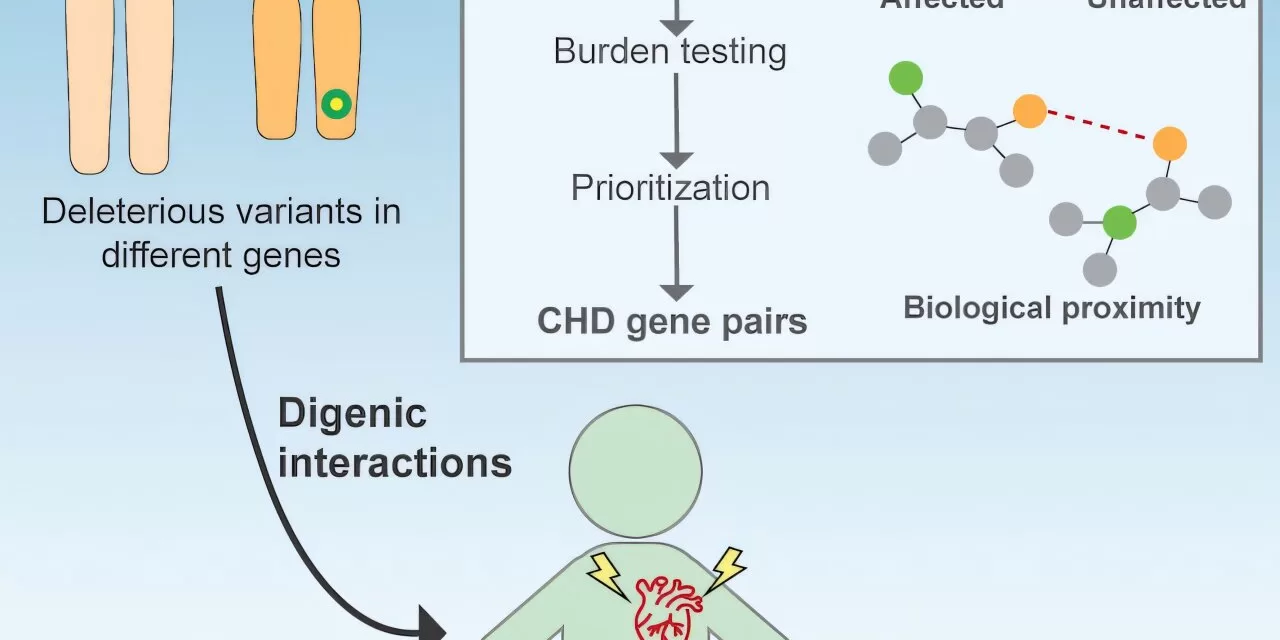Scientists uncover new genetic interactions that could revolutionize CHD diagnosis and treatment.
Researchers at the Icahn School of Medicine at Mount Sinai and their collaborators have identified previously unknown genetic interactions that may contribute to congenital heart disease (CHD), one of the most common birth defects worldwide. Their findings, published in The American Journal of Human Genetics in a paper titled “Deciphering the digenic architecture of congenital heart disease using trio exome sequencing data,” shed new light on the complex genetic factors underlying CHD.
Uncovering Hidden Genetic Risks
“Our research reveals the potential for digenic inheritance—where two genes work together to cause disease—expanding our understanding of the genetic underpinnings of congenital heart disease,” said Dr. Yuval Itan, Associate Professor of Genetics and Genomic Sciences at the Icahn School of Medicine at Mount Sinai and co-corresponding senior author of the study.
He co-supervised the research with Dr. Bruce Gelb, Gogel Family Professor and Director of The Mindich Institute. “By identifying these gene pairs and their combined effects, we uncover previously hidden genetic risks, which could improve diagnostic precision and open new avenues for personalized treatment strategies.”
A New Approach to Genetic Diagnosis
CHD is the most prevalent congenital anomaly, yet more than half of cases remain without a clear molecular diagnosis. By analyzing trio exome sequencing data from affected and unaffected children in the Pediatric Genomic Consortium (PCGC), the researchers identified 10 novel gene pairs potentially linked to CHD.
“Our work demonstrates that genetic interactions, rather than single-gene causes alone, could play a significant role in congenital heart disease,” said Dr. Meltem Ece Kars, a postdoctoral fellow at The Bronfman Institute and first author of the study. “By developing a method to uncover these interactions, we are broadening the scope of genetic research, which could lead to improved diagnosis, enhanced risk assessment, and more informed genetic counseling.”
As clinical genetic testing continues to evolve, the integration of digenic models could significantly improve diagnostic accuracy, offering patients and their families better clarity about their condition and guiding the development of targeted therapies and interventions.
Transforming Genetic Research
The research team utilized an advanced computational approach to identify gene pairs that may act together to cause CHD. This innovative method could revolutionize genetic studies of complex diseases by providing deeper insights into how multiple genes interact in disease development.
Beyond CHD, the study’s findings pave the way for advancements in diagnosing other complex disorders. “With the tools we’ve developed, our research provides a framework for future studies into genetic interactions that could affect a wide range of human diseases,” said Dr. Itan.
Looking ahead, the researchers plan to apply their digenic approach to other diseases traditionally studied under a monogenic model, potentially uncovering missing heritability in these disorders. Ultimately, they aim to extend this method into a comprehensive polygenic framework capable of identifying multiple disease-causing variants in patients.
“Our findings hold promise for improving genetic diagnoses, offering better risk assessments, and ultimately guiding more personalized treatments for individuals with congenital heart disease,” concluded Dr. Kars.
Reference: Deciphering the digenic architecture of congenital heart disease using trio exome sequencing data, The American Journal of Human Genetics (2025). DOI: 10.1016/j.ajhg.2025.01.024. www.cell.com/ajhg/fulltext/S0002-9297(25)00044-8
Journal Information: American Journal of Human Genetics
Disclaimer: This article summarizes recent scientific research and is intended for informational purposes only. It does not provide medical advice or diagnosis. Individuals concerned about congenital heart disease should consult a healthcare professional for personalized medical guidance.











